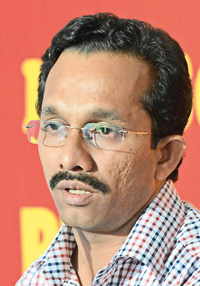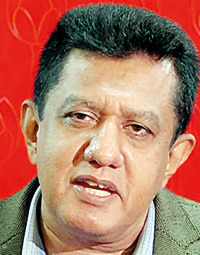News
SLPP Govt. cannot COPE: Handunnetti slams moves to upend transparent scrutiny
Tasked with ensuring financial discipline in public corporations and semi-Governmental bodies in which the Government has a financial stake, the Committee on Public Enterprises (COPE) is Parliament’s one of the most important oversight committees.

Sunil Handunnetti
The Committee’s activities came into sharp public focus during the previous (Eighth) Parliament, when Janatha Vimukthi Peramuna’s then Parliamentarian Sunil Handunnetti headed it.
This was after the Committee’s proceedings were opened to the media for the first time.
Under Mr. Handunnetti’s stewardship, COPE submitted nine reports to Parliament. These included general reports covering many institutions and special reports such as those on the financial irregularities related to the issuance of Treasury bonds, the Airbus deal for SriLankan Airlines and the importation or rice for Lanka Sathosa Limited.
In an interview with the Sunday Times, the former chairman, now out of Parliament, however, warned that the progressive measures taken to strengthen COPE during the previous Parliament were now in jeopardy with the new Sri Lanka Podujana Peramuna (SLPP)-led Government seemingly intent on dismantling institutions that acts as checks against the Executive and Government power.
There is a popular misconception that COPE “is there to catch thieves,” Mr. Handunnetti said. “COPE is a mechanism to evaluate performances of various state institutions. In the course of investigations, COPE, however, also uncovers acts of wrongdoing. But the responsibility of taking action against individuals involved in such acts rests with the authorities — the Ministry Secretaries, institution heads, the Cabinet and the President himself.”
Mr. Handunnetti pointed out that some COPE probes had led to prosecutions, such as in the case of the Central Bank treasury bond issue, though in other cases, the authorities had not taken action against the culprits.
Nevertheless, several initiatives were taken during the previous Parliament to strengthen COPE’s role and make its activities more transparent, he added. For one, Parliament’s Standing Orders were amended, requiring the subject minister to submit a report within eight weeks on the followup action taken regarding COPE’s revelations on a public enterprise. This report too would then come under COPE scrutiny.
A decision was also taken where if a minister is a member of COPE, he could not sit in when an institution under his purview was called before it.
To strengthen COPE and make it more meaningful, COPE, he said, opened its door to the media so that wrongdoings could be exposed to the public. “The media keep asking questions from the institutions involved and their heads, and following up the story. It creates a public dialogue, so the wrongdoers will not be able to hide. We may not be able to stop wrongdoing, but at least, the public will know these wrongs are happening. That is a powerful thing.”
Mr Handunnetti was dismissive of the claim made by some sections of the Government that COPE under his chairmanship had conducted “a media circus” through live telecast of the proceedings. One could call it a media circus if the committee picked and chose which parts of the proceedings could be telecast, he argued. But, all proceedings were shown in full without any edits. These proceedings are even now available on the Parliament’s website. “It is not my fault if some television channels picked and chose certain parts for their news bulletins according to their own agendas. That’s not on me or COPE,” he said.
If the COPE in the new Parliament now moved to deny media access to cover proceedings and revert to closed-door meetings, Mr Handunnetti warned it would again enable wrongdoers to escape and ministers to intimidate Government officials or conceal information. “It would be a denial of the right to information. I was a member of COPE for 15 years. I have seen how certain ministers intimidated officials even during committee proceedings to hide their wrongdoings.”
Asked about moves to abolish the Audit Service Commission, as envisaged under the proposed 20th Amendment to the Constitution, Mr. Handunnetti said it would impact COPE as it would restrict auditing on some 117 key State institutions, including SriLankan Airlines, Sri Lanka Insurance, Ceylon Electricity Board, Lanka Hospitals and Milco; all of which have faced serious corruption allegations. “The investigations are carried out based on the reports submitted by the Auditor General. What use is there in calling such institutions when the Auditor General has been denied the chance to audit them?”
Mr. Handunnetti questioned why the Government had appointed a first-time MP as COPE Chairman. “Even if a Government member acts as COPE Chairman, it would not be a problem provided he can function impartially, but there is always the risk that such a person will come under severe pressure from senior members of his own Government when exercising his duties.
“The person holding the post of a committee such as COPE must have Parliamentary experience and how COPE functions and of the inner workings of the various institutions that are called before it,” he said.
| Judge me by my performance: New COPE chief | |
| Says no decision to shut media out The COPE of the Ninth Parliament is determined to play a productive role to ensure the public’s trust, new COPE Chairman Charitha Herath told the Sunday Times.  Charitha Herath COPE under Sri Lanka Podujana Peramuna first time Parliamentarian Prof. Herath will begin proceedings from October 6. “The Auditor General has informed us that there are 31 completed audit reports on different institutions, so we will start with those reports and other documentation which the Auditor General submits to us,” he said. Some of the institutions that COPE will call before it next week include the Ceylon Coal Company (Pvt) Ltd, the Lakvijaya Power Plant and the Central Environment Authority. COPE will also take up the special audit report on the feasibility study and procurement activities of the Central Expressway. Contrary to certain reports, Prof. Herath insisted COPE had not taken a decision to stop live telecasts of COPE proceedings or to deny the media access to the Committee proceedings. The Parliamentary Business Committee chaired by the Speaker and including party leaders, however, had decided to reevaluate Parliament’s entire media arrangement, and this had been misinterpreted to say that COPE had decided to bar the media from its proceedings, he noted. “For our part, we had a discussion on this subject when we met last month and we decided to take a decision on October 6. With regard to COPE, I think we will most probably allow things to continue as they did in the Eighth Parliament, when they started showing COPE proceedings live.” The new COPE chairman added that some Government officials had complained that only their questioning by COPE had been shown in the media while their responses were not. Some had also pointed out that the issues taken up before the Committee were matters related to the previous administrations of these institutions and felt they, who were not involved in these acts, were being shown as culprits in these matters. The Committee will consider these observations and look to develop a mechanism for the people to better understand what is going on in these institutions, Prof. Herath emphasized. Regarding criticism over his alleged lack of experience, Prof. Herath stressed that though he is new to Parliament, he is not new to politics or the State mechanism. “I participated in COPE proceedings as the Chairman of one institution and the Secretary of one Ministry. So for nearly 10 years prior to this, I have been participating in COPE proceedings as a Government official. I might be the only COPE chairman who has such experience; both as a Government officer and a politician. I am sorry to say that my academic and administrative credentials and political experience are better than some of those who are making these allegations,” he remarked. The Auditor General’s Department was there before the 19th Amendment and will be there after the 20th Amendment. The abolishing of the Audit Service Commission will not prevent the Auditor General from auditing these institutions, he further insisted. He also asked the public to “look at the facts” over criticism regarding the post of COPE Chairman being given to a Government MP. “We have had 14 COPE Chairmen up to now. I will be the 15th. Of these 14, 10 were from the government while four were from the opposition. There were both good and bad chairmen from the Government and the Opposition. Their good or bad reputations do not come from which party they represent but from how well they worked. I believe I can do a productive and impartial job as COPE Chairman,” he insisted. |

